ISLAMABAD: Pakistan’s decision to ban single-use plastic has met with hurdles of its own ranging from confusion in the federal capital in the absence of alternatives to huge wave of unemployment expected from the plastic manufacturing industry.
Ranked number seven on the index of climate change, the country banned single-use plastic bags in the federal capital from August 14 as part of the government’s plans to make the country greener.
However, an altercation between Pakistan’s Environment Protection Agency (EPA) and Islamabad’s most frequented eatery, Savour Foods, this week caught media attention and the incident’s video widely shared on social media has highlighted the challenges of the freshly introduced single-use plastic bag ban law enforced from last week introduced by the Ministry of Climate Change.
“We want Pakistan to be plastic-free because it is a burden on our environment,” Zartaj Gul, State Minister for Climate Change said last week in an exclusive interview to Arab News adding that Pakistan wanted to demonstrate to the world that it was “contributing to green initiatives.”
Pakistan is the 128th country to stop the use of the non-biodegradable material made from various type of polymers that are harmful to the environments and has been running awareness campaigns much ahead of imposing the ban but not all have adopted and accepted the new law in the capital.
Savour Foods, well known for its tasty Pulao (rice) with chicken and a local variety of shaami kabab accompanied with yogurt and salad serving thousands daily in house and take away which heavily uses plastic bags for its food reacted to EPA enforcement team’s attempt to confiscate the plastic bags from their premises during rush hour.
The EPA officials were pushed out by the restaurant staff resulting in authorities taking strict action, arresting staff members, sealing the restaurant and imposing a hefty fine.
On Wednesday, the eatery’s management submitted unconditional apology and replaced the plastic bags with environment friendly ones assuring to “comply to the rules and regulations of climate change [ministry],” according to Muhammad Naeem, the chief executive of Savor Foods.
The EPA spokesman, Naseem-ur-Rehman Shah who has petitioned for years in the country’s courts to ban use of plastic bags told Arab News that the agency has taken notice of the backlash from businesses and industries on its pilot program in Islamabad and EPA has decided to share its plan with the federal cabinet for further awareness campaigns before authorities can fully enforce the ban.
“Islamabad has implemented the law and ignorance of that law is no excuse,” Rehman said.
“We are determined to wipe out the use of [plastic] shopping bags because of its impact on the environment. But plastic manufacturing industry is the second largest with 600,000 workers that will go jobless and we have to take that inconsideration as well,” he added.
“Our proposed plan summary to the parliament is to have plastic manufactures to produce thicker bags for multi-use purpose before these bags can be phased out. We are willing to give the industry two years to change their business model and pay off their loans borrowed from financial institutions during this period.”
The traders’ union of Islamabad on Wednesday protested EPA’s harsh measures to enforce the ban slapping fines and conducting city wide raids to confiscate plastic bags given by retailers to consumers. Rehman said EPA had expected “agitation” from traders, but authorities will take them in to confidence after the plan is approved by the government.
The ban has sparked a debate with residents and retailers voicing their concerns, both equally facing problems while welcoming the ban, trying to respect the law, but finding no alternative readily available across markets to carry goods.
Grocery store owner, Naseem Khattak told Arab News that customers argue demanding shopping bags at his store which he has removed.
“I can’t afford to give a fine of Rs. 5000 by authorities for breaking the law. My sale has dropped because I am being forced to sell items without an affordable carrying bag to replace the banned plastic (bag) so customers carry items out of my store in their hands,” Khattak said.
Most shopkeepers have resorted to giving thin paper bags to the customers with no handles, incapable of holding more than two small items and a tendency to rip easily. Smaller shops which have incurred loss replacing the plastic bags were charging customers for paper bags.
Most customers on the streets of Islamabad slam the government for not handing down an alternative measure to the retailers to introduce a uniform change.
“Some of the retailers in the market are giving flimsy paper bags that can’t hold purchased goods. The government should introduce bag material and design that retailers need to adopt as replacement of the plastic bags because we can’t continue carrying our grocery shopping in hands,” said one of the shoppers Sania Sadaf, adding that “this is not practical.”
Ban on use of plastic bags leaves retailers, customers clueless in Islamabad
Ban on use of plastic bags leaves retailers, customers clueless in Islamabad
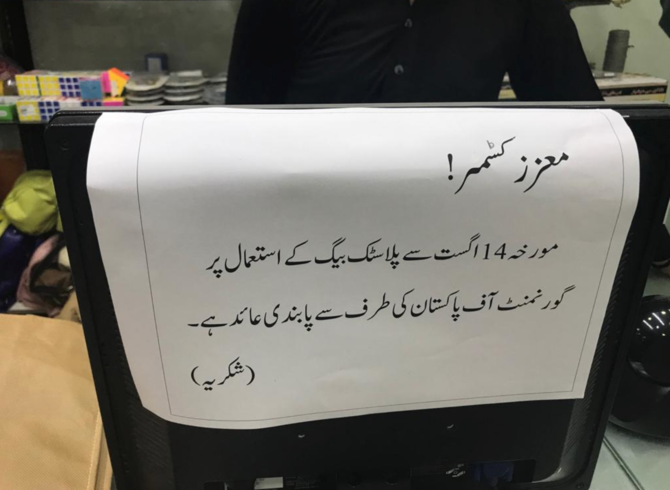
- Traders, retailers, and consumers voice concern demanding alternative of plastic shopping bags
- Authorities banned single-use plastic bags in the federal capital from August 14
Pakistan stocks close at record high amid IMF talks, tensions in Middle East
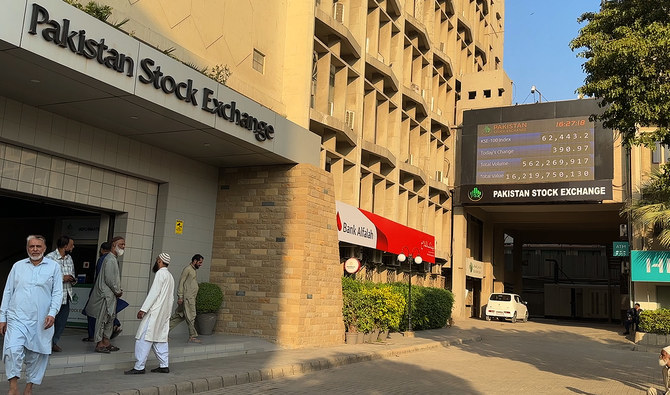
- The benchmark KSE-100 index surged by 647 points after morning trading hiccups due to reports of Israel’s attack on Iran
- Pakistani analysts say escalating tensions in Middle East will impact supply chain and increase import bill for Pakistan
KARACHI: Pakistan’s stock market recorded on Friday its highest-ever closing at 70,909 points, stock brokers and analysts said, attributing it to ongoing talks with the International Monetary Fund (IMF), but cautioning about potential economic impact of Israel-Iran tensions in the Middle East.
Explosions were heard in Iranian city of Isfahan on Friday that were described as an Israeli attack by western media. However, Tehran has not officially confirmed the development as its response remains muted.
The Pakistan Stock Exchange witnessed some nervousness in the morning trading session, when news of Israel’s attack on Iran came in. But despite the development, the benchmark KSE-100 index surged by 647 points to close at 70,909 points.
“When news of the attack on Iran came this morning, its impact was seen in the Asian and European markets at one point,” Shehryar Butt, portfolio manager at the Karachi-based Darson Securities, told Arab News.
“Nikkei saw a decline of more than a thousand points, but despite this, the Pakistan Stock Exchange performed much better.”
The Pakistani bourse has recently been trading at record highs amid positive sentiment prevailing among investors due to hopes of the country’s successful talks with the IMF.
“The basic reason for this is that Pakistan is currently in the IMF program, and very serious discussions are taking place in Washington at this time,” Butt said.
Pakistan’s finance minister, Muhammad Aurangzeb, is currently in Washington to hold talks with IMF officials for a new long-term loan program as Pakistan’s current $3 billion program is due to expire this month. The finance minister has expressed his hopes that the outline of the new program will be agreed next month.
Pakistan is expected to demand a loan size of around $7 billion but Jihad Azour, the IMF Middle East and Central Asia Director, said on Wednesday the reform package was more important than the size of the program.
“I would say the package of reform is now more important than the size of the program because we saw recently that the right measures provided the right response,” Azour said at a press briefing.
The surge in global oil prices amid geo political tensions and the Pakistani rupee’s recovery played “a catalyst role in Friday’s record close,” according to Ahsan Mehanti, CEO of the Arif Habib Corporation.
Though Pakistan’s market downplayed the Middle East tensions, but analysts said if the situation escalated, it would disrupt supply chain and impact Pakistan’s economy.
“The conflict between Iran and Israel will affect the Pakistani economy, quite a negative effect will be seen on the Pakistani economy because immediately after that, we saw geo-political situation worsening and oil started to rise,” Butt said, adding the rising global oil prices would impact Pakistan’s import bill.
Pakistan has imported petroleum products worth $12 billion during the July-March period of the current fiscal year, including $3.9 billion worth of crude oil and 2.9 billion worth of liquefied natural gas (LNG), according to official data.
Butt feared that if the situation persisted, then the attention of Saudi Arabia would also be drawn to the Middle East and the investment commitments made by the Kingdom with Pakistan could be delayed.
Haroon Sharif, an economist and former chairman of the Pakistan Board of Investment, said if the tensions in the Middle East escalated, their first impact would be on the stock market as foreign investors would like to shift their capital to safer markets.
“Another impact would be oil price escalation, hitting Pakistan’s trade deficit and traveling and cargo price would also escalate, increasing the cost of doing business,” Sharif said, adding that investors would hold their future expansion and investment plans till situation becomes stable.
Husain Haqqani, a former Pakistani ambassador to the United States and scholar at Washington DC’s Hudson Institute, said a prolonged conflict between Iran and Israel would increase uncertainty and instability across the Middle East.
“If Iran’s drone and missile attack on Israel was meant to show Iran’s reach, Israel has demonstrated its ability to strike deep inside Iran,” Haqqani told Arab News.
“Iran has several proxies that it can use while Israel has tremendous military and intelligence capabilities. Leaders of both countries have domestic political reasons to not be forgiving toward one another.”
Haqqani said the US would likely restrain Israel, while Iran would be constrained by its limited capability.
“After all, even after attacking with hundreds of missiles and drones, Iran was unable to cause real damage on ground in Israel,” he added.
Death toll from heavy rains in northwest Pakistan rises to 39
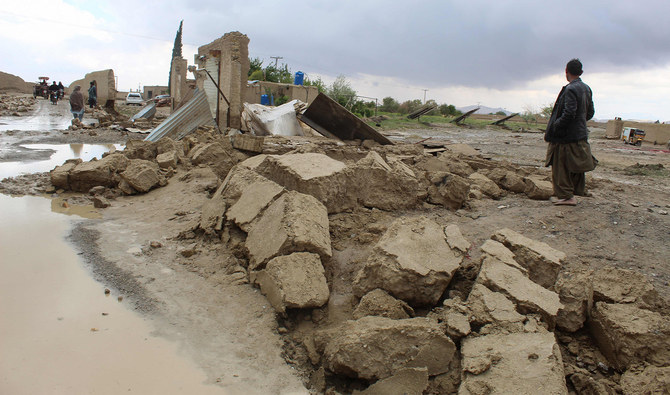
- The rains that began last Friday have damaged 2,391 houses across the northwestern Khyber Pakhtunkhwa province
- In southwestern Balochistan province, heavy rains have killed 15 people, triggered flash floods in several areas
PESHAWAR/QUETTA: The death toll from continuing rains in Pakistan’s northwestern Khyber Pakhtunkhwa (KP) province has risen to 39, while another 54 people have been injured in various incidents, the KP Provincial Disaster Management Authority (PDMA) said on Friday.
The rains that began last Friday have caused damages to 2,391 houses in several districts across the province, according to the PDMA.
Khyber, Dir Lower and Upper, Chitral Upper and Lower, Swat, Shangla, Bajaur, Malakand, Karak and Tank districts have been declared the most affected by the downpours.
“As many as 23 children, eight men and eight women are among those died in rain related incidents during the last eight days,” the PDMA said in a statement on Friday.
The current spell of showers, which began on April 17, was likely to continue till April 21, the PDMA said this week.
The provincial government has released Rs110 million to be distributed among the affected families and dispatched aid, including tents, kitchen kits, blankets, hygiene kits, mosquito nets and mattresses, to the affected areas, according to the authority.
As the rains were expected to continue intermittently until April 21, the PDMA said it had already a letter to administration of all districts to remain alert and take precautionary measures.
In the southwestern Balochistan province, heavy rains have killed 15 people since Friday and triggered flash floods in several areas, according to provincial authorities.
Balochistan Chief Minister Sarfaraz Bugti said climate change had become a “challenge” for the provincial government.
“Current rains are unusual which were never reported in a thousand years,” he told reporters on Friday. “The government has been helping the masses with available resources and our teams have reached all districts to help the people affected by rains and floods.”
Pakistan has received heavy rains in the last three weeks that have triggered landslides and flash floods in several parts of the South Asian country.
The eastern province of Punjab has reported 21 lighting- and roof collapse-related deaths, while Balochistan, in the country’s southwest, reported 10 deaths as authorities declared a state of emergency following flash floods.
In 2022, downpours swelled rivers and at one point flooded a third of Pakistan, killing 1,739 people. The floods also caused $30 billion in damages, from which Pakistan is still trying to rebuild.
CM Bugti promises ‘good governance’ as 14-member cabinet takes oath in Pakistan’s Balochistan
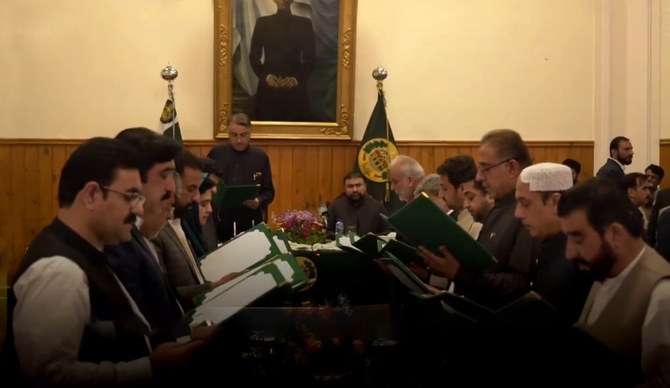
- Development came more than two months after Balochistan elected its representatives in Feb. 8 national polls
- CM Sarfraz Bugti says the formation of the cabinet took time due to consultation with all coalition partners
ISLAMABAD: Balochistan Chief Minister Sarfraz Bugti on Friday promised “good governance” and provision of maximum relief to public as his 14-member cabinet took oath in the southwestern Pakistani province, Pakistani state media reported.
The cabinet members were sworn in at a ceremony held at the Governor House in the provincial capital of Quetta, where Governor Malik Abdul Wali Kakar administered the oath to them.
The development came more than two months after Balochistan elected its representatives in the national election that was held on February 8, this year.
Bugti said the formation of the cabinet took time due to consultation with all coalition partners, the state-run APP news agency reported.
“Balochistan was facing many challenges, including terrorism,” he was quoted as saying in the report. “Providing maximum relief to the public and strengthening good governance were key priorities for the provincial government.”
Balochistan is the site of a long-running insurgency by separatist and religiously motivated militants, who have recently carried out a number of attacks in the region.
Gunmen this month killed nine people, who hailed from the eastern Punjab province, after abducting them from a bus on a highway near the Noshki district. The outlawed Balochistan Liberation Army claimed responsibility for the attack.
Although the government says it has quelled the insurgency, violence by groups demanding independence from the central government has persisted in the province.
Pakistan says will continue ‘constructive engagement’ with Riyadh to enhance economic, strategic partnership
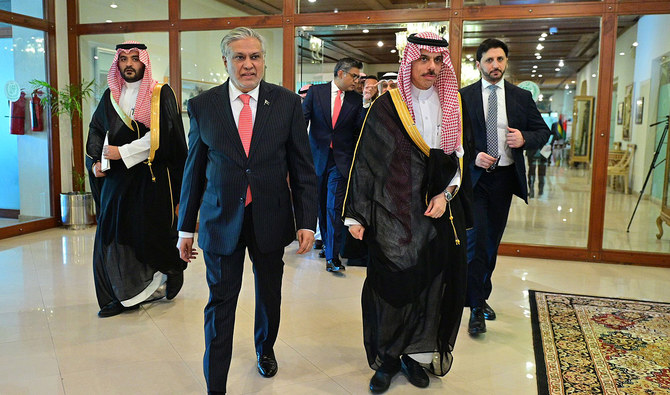
- Saudi foreign minister visited Islamabad this week to discuss investments
- Saudi deputy defense minister is also currently visiting Pakistani capital
ISLAMABAD: Pakistan’s foreign office said on Friday the South Asian country would continue its “constructive engagement” with the Kingdom of Saudi Arabia to enhance economic and strategic partnerships between the longtime allies.
Saudi Foreign Minister Faisal bin Farhan Al Saud came to Islamabad on a two-day visit this week aimed at strengthening bilateral economic cooperation and pushing forward previously agreed investment deals. Pakistan has said it pitched investment projects worth$30 billion to Riyadh during Prince Faisal’s visit.
The Saudi official’s visit followed a meeting in Makkah between Prime Minister Shehbaz Sharif and Saudi Crown Prince Mohammed bin Salman in which the Kingdom had pledged to expedite $5 billion in investments.
“We will continue our constructive engagement with the Kingdom of Saudi Arabia to enhance our economic and strategic partnership,” foreign office spokesperson Mumtaz Zahra Baloch said at a weekly briefing, giving details of Prince Faisal’s visit, whose purpose she said “was to accelerate discussions on enhanced bilateral economic cooperation in the follow up of the understandings reached between Prime Minister of Pakistan Muhammad Shehbaz Sharif and Crown Prince and Prime Minister of the Kingdom of Saudi Arabia His Royal Highness Mohammed bin Salman.”
At a ‘Saudi Arabia-Pakistan Investment Conference’ co-chaired by the two foreign ministers in Islamabad, the two sides discussed investment proposals in diverse sectors such as energy, mining, agriculture, information technology, construction, human resource development and exports, Baloch said, adding that the investment conference was aimed at paving the way for Saudi investments in Pakistan.
“The Foreign Ministers of Pakistan and Saudi Arabia discussed global and regional developments,” Baloch added.
“There was unanimity of views on the increasing instability in the region. The two Foreign Ministers urged de-escalation and called for an immediate ceasefire, lifting of the siege of Gaza and access to unimpeded humanitarian aid for the besieged people of Gaza.”
The spokesperson said Pakistan was “deeply disappointed” at the result of last night’s debate at the United Nation Security Council and its inability to reach consensus and recommend Palestine’s membership of the UN to the General Assembly.
“We regret the US decision to veto the draft resolution granting full membership of the UN to Palestine,” Baloch said.
Rohit says India-Pakistan Test cricket would be ‘awesome’
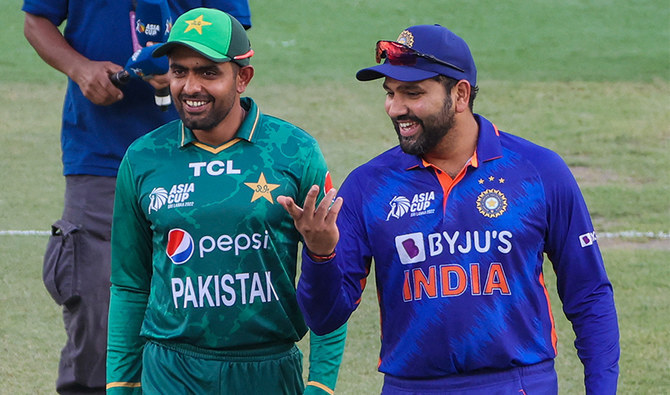
- South Asian neighbors are bitter political adversaries, have not faced off in Test since 2007
- They play only occasionally in shorter versions of game usually on neutral territory
NEW DELHI: India captain Rohit Sharma has thrown his support behind any resumption of Test cricket against arch-rivals Pakistan, saying it would be “awesome.”
The South Asian neighbors are bitter political adversaries and have fought three wars against each other since they were partitioned at the end of British colonial rule in 1947.
Their cricket teams have not faced off in a Test since 2007. Instead they play only occasionally in the shorter versions of the game and usually on neutral territory in international tournaments.
Rohit appeared Thursday on a YouTube chat show hosted by former captains Adam Gilchrist of Australia and Michael Vaughan of England.
Asked by Vaughan if playing Pakistan in a Test series would be beneficial for the five-day game, Rohit said: “I totally believe that.”
“They are a good team, superb bowling line-up, good contest. Especially if you play in overseas conditions, that will be awesome,” added the 36-year-old.
“I would love to. It would be a great contest between two sides... so why not?“
Australia has said it would be prepared to host a series between the rivals.
India and Pakistan have not faced each other on either side’s soil in a bilateral series since 2012.
India last year refused to travel to Pakistan for the white-ball Asia Cup, prompting part of the tournament to be staged in Sri Lanka.
They last met at the 50-over World Cup in India in October.











